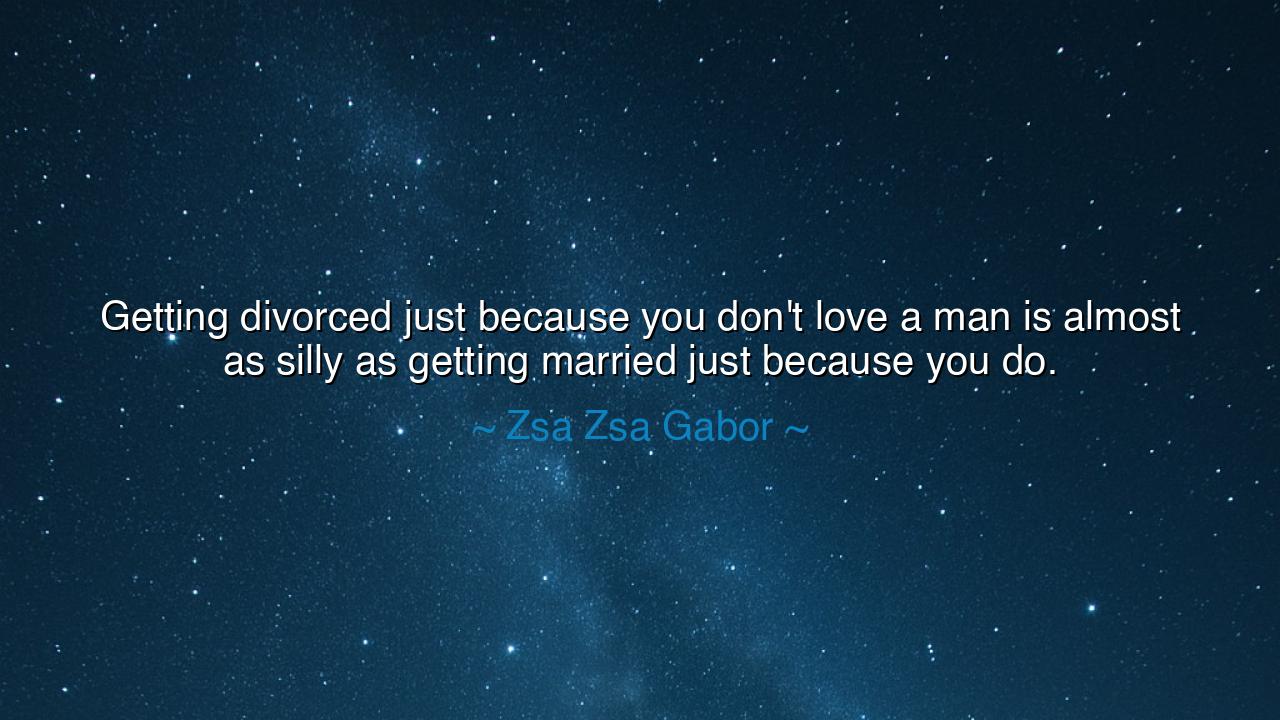
Getting divorced just because you don't love a man is almost as
Getting divorced just because you don't love a man is almost as silly as getting married just because you do.






“Getting divorced just because you don’t love a man is almost as silly as getting married just because you do.” So spoke Zsa Zsa Gabor, the Hungarian-born actress and socialite, famed for her wit as much as her beauty. Her life—glittering, turbulent, filled with marriages, divorces, and headlines—became a mirror through which she observed the follies of love and society. Beneath the sparkle of her humor lies a profound truth, one shaped by experience: that love, though powerful, is not the sole foundation of marriage, and that the absence of love is not always its death. In her jesting tone, she delivers a lesson on wisdom, balance, and the difference between passion and partnership.
When Gabor speaks of marriage and divorce in this way, she is mocking not love itself, but the blindness with which people approach it. To marry “just because you love” is to mistake emotion for endurance; to divorce “just because you don’t” is to mistake change for failure. Love, as she implies, is a fire—radiant, consuming, glorious—but no fire burns endlessly without tending. A marriage built only upon passion will fade like a bonfire left unattended, while one abandoned at the first chill of disappointment may have yet held the embers of renewal. Gabor’s humor conceals the wisdom of endurance: that commitment, not impulse, is the true measure of a lasting union.
The origin of this wisdom may be traced to her own life and the world she inhabited—a world of glamour, fame, and fleeting affection. Zsa Zsa, married nine times, knew both the intoxication and the disillusionment of romance. She moved among the powerful and the passionate, yet saw how easily both love and vanity can deceive. Her words do not preach against marriage or against love, but against foolishness—against mistaking the feeling of love for the art of living with another soul. She had come to understand that love, though divine in birth, must be guided by discipline if it is to endure upon the earth.
Consider, then, the story of Queen Victoria and Prince Albert, whose marriage was one of the great partnerships of history. Their union began not merely in passion, but in respect and shared purpose. Yet when Albert died young, Victoria’s grief did not destroy her—it deepened her. She lived forty years more, wearing black, tending to his memory, guiding an empire. Their love was not the fire of fleeting romance but the steady lamp of companionship, founded on duty and devotion. Contrast this with the countless unions of the rich and the famous, where passion burns bright and dies swiftly, for it is not anchored in patience or mutual purpose. Zsa Zsa Gabor, speaking from her own experiences among such fleeting affairs, understood this distinction too well.
The ancients themselves knew this truth. In the philosophies of the East and West, marriage was never seen as the pursuit of pleasure alone, but as a union of souls, a partnership in labor, faith, and growth. The Greeks spoke of three kinds of love—eros, the love of desire; philia, the love of friendship; and agape, the love of the spirit. The wise taught that a marriage must contain all three, but if it rests on eros alone, it collapses like a temple built on sand. Gabor’s quote, though playful, echoes this eternal wisdom: that love is the beginning of marriage, not its guarantee.
Yet her words also offer a warning to the modern age, where impatience has become the enemy of love. Too often, couples seek perfection rather than perseverance, novelty rather than nurture. When love grows quiet, they mistake peace for emptiness and flee in search of excitement. But marriage, as the elders teach, is not always bliss—it is a forge where two imperfect beings are shaped by time, conflict, and forgiveness. To leave too quickly is to abandon the work before the gold is refined. To stay blindly, without respect or compassion, is folly as well. Zsa Zsa’s wisdom lies in her balance—knowing when love must be tended, and when the fire has truly turned to ash.
So, my listener, take from her words this lesson of discernment. Love freely, but love with eyes open. Do not wed on passion alone, nor part on disappointment alone. Seek the quiet virtues that outlast desire: kindness, patience, humor, and understanding. For marriage, when built wisely, becomes not a prison but a partnership, not a fading romance but a shared pilgrimage through the years.
And thus, in her wit, Zsa Zsa Gabor gave voice to an ageless truth disguised in laughter: that the heart must be both tender and wise. To marry is not merely to love, but to promise; to divorce is not merely to stop loving, but to cease believing. The art of life lies in knowing the difference. When love is both fire and light, it warms and guides. But when it is only flame without care, it consumes. Therefore, let the wise love deeply—but also, let them love wisely.






AAdministratorAdministrator
Welcome, honored guests. Please leave a comment, we will respond soon